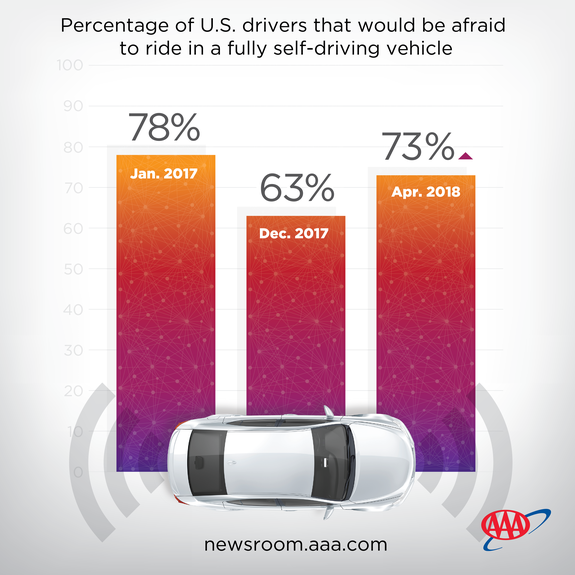People are losing faith in self-driving cars following recent fatal crashes

For a while, people were really excited about the potential of self-driving cars, which promised to make our future commutes easier, more productive, and safer. Then came some high-profile autonomous vehicle accidents — including two fatal crashes — and let's just say the excitement has waned a bit.
SEE ALSO: Tesla's Autopilot fails haven't shaken my faith in self-driving cars. Here's why.
A new survey released Tuesday by the American Automobile Association found that 73 percent of American drivers are scared to ride in an autonomous vehicle. That figure is up 10 percent from the end of last year.
The millennial demographic has been the most affected, according to the survey of more than 1,000 drivers. From that age group, 64 percent said they're too afraid to ride in an autonomous vehicle, up from 49 percent — making it the biggest increase of any age group surveyed.
This data follows similar trends showing increased fear about self-driving vehicles following the deadly March crashes in the Bay Area and Arizona.

Image: aaa
Another survey from car shopping site CarGurus set to be released Wednesday found that car owners aren't quite ready to trade their conventional vehicles for self-driving ones. Some 84 percent of the 1,873 U.S. car owners surveyed in April said they were unlikely to own a self-driving car in the next five years. Even more indicative of consumer sentiment on autonomous vehicles: 79 percent of respondents said they were not excited about the new technology. Broken down regionally, the most excited drivers hail from the West Coast.
Tesla came up as the top brand trusted to develop self-driving tech, with 24 percent naming the electric car maker. Waymo, Google's autonomous car company, was only trusted by 5 percent of drivers surveyed.
Safety played a big role in how people feel about self-driving cars—for both those excited and those concerned. Like online videos of Tesla's Autopilot feature show us, the tech can lead you into danger or save you from a swerving truck. It's a two-sided coin, for sure.
But actually experiencing an autonomous ride can assuage growing fears. University of Iowa engineering professor Daniel McGehee, director of the National Advanced Driving Simulator, has seen the sort of thing the survey results are showing. More than two decades ago, he was researching GPS navigation systems for mapping. Initial feedback from consumers was, "this is the dumbest thing on the planet," he said. Early surveys came back indicating that people would never use GPS since they had paper maps.
It's funny now in the age of Google Maps, when most people prefer digital tracking to anything paper. McGehee compares this to today's standards of conventional, human-controlled vehicles. We aren't able to envision anything other than what it's always been.
He said it's difficult for consumers to accept new technologies, "until they experience them." Once exposed to lane-keeping tech, adaptive cruise control, automatic braking, and other semi-autonomous features, people get more comfortable and eventually "perceptions change," he said.
McGehee presented at a forum at the AAA Foundation for Traffic Safety earlier this year, explaining that as knowledge increases, so does trust. Apprehension goes down. Ride-alongs boost user knowledge and decrease fear of the tech, he found.
Meanwhile, the Society of Automotive Engineers International, or SAE, had a "demo day" in Tampa, Florida, earlier this month showing off autonomous vehicles. A survey found that after 250 participants rode in a Level 4 autonomous vehicle from Perrone Robotics, 85 percent would allow their kids to ride in a fully automated self-driving car, an apparent indicator of trust for the vehicles.
SAE International chief product officer Frank Menchaca said people were skeptical before they got in, but after driving 55 mph in a cordoned-off section of freeway, they were more accepting of the vehicles. "There was certainly a difference of perception of safety before and after," he said in a call. He recalled a rider in his 90s who "seemed to be perfectly at ease with it."
Menchaca wants to get more people trying out the autonomous vehicles. "It seems once people experience the ride, they maybe get a more nuanced understanding of what the experience is," he said.
But no matter how it's analyzed, big crashes have spooked the riding public. Hopefully it's not enough to slow down what could be a promising technology. As McGehee assured, "It will take some time."
WATCH: The future of self-driving taxis may be closer than you think


 Yahoo News
Yahoo News 
